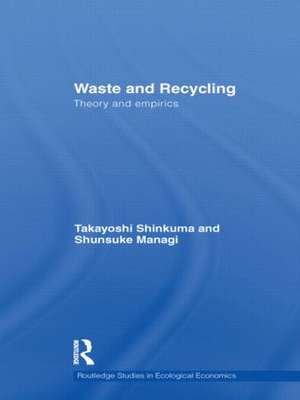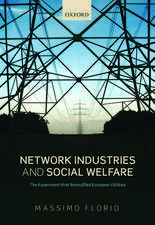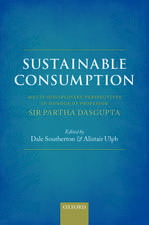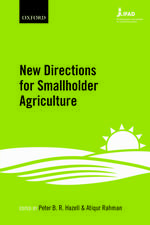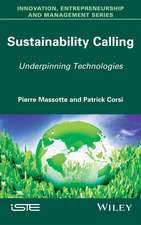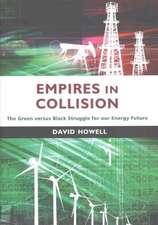Waste and Recycling: Theory and Empirics: Routledge Studies in Ecological Economics
Autor Takayoshi Shinkuma, Shunsuke Managien Limba Engleză Hardback – 25 mar 2011
The book also raises thoughtful questions on how household waste management services should be privatized and who should pay for the disposal and recycling costs. It attempts to answer these questions. The book considers several factors hindering the first-best optimal outcome and highlights two crucial ones. It elaborates further with models and the solutions on how to overcome these obstacles.
The book covers not only traditional resource economics and waste management, but also the recent problem of Electric waste (E-waste) and illustrates in details, how the environments of developing countries are inevitably polluted even with the Basel ban Amendment in place. The book proposes an alternative international trading regulation to address E-waste. This book will certainly appeal to industry decision-makers, policy makers and legislators.
Din seria Routledge Studies in Ecological Economics
-
 Preț: 311.41 lei
Preț: 311.41 lei -
 Preț: 151.85 lei
Preț: 151.85 lei -
 Preț: 310.31 lei
Preț: 310.31 lei - 26%
 Preț: 819.09 lei
Preț: 819.09 lei - 25%
 Preț: 851.99 lei
Preț: 851.99 lei -
 Preț: 412.70 lei
Preț: 412.70 lei -
 Preț: 487.75 lei
Preț: 487.75 lei - 18%
 Preț: 1167.58 lei
Preț: 1167.58 lei -
 Preț: 397.54 lei
Preț: 397.54 lei -
 Preț: 482.53 lei
Preț: 482.53 lei -
 Preț: 484.47 lei
Preț: 484.47 lei -
 Preț: 411.42 lei
Preț: 411.42 lei -
 Preț: 421.02 lei
Preț: 421.02 lei - 12%
 Preț: 341.66 lei
Preț: 341.66 lei - 11%
 Preț: 336.99 lei
Preț: 336.99 lei - 15%
 Preț: 423.89 lei
Preț: 423.89 lei - 18%
 Preț: 1167.36 lei
Preț: 1167.36 lei -
 Preț: 485.75 lei
Preț: 485.75 lei - 13%
 Preț: 295.07 lei
Preț: 295.07 lei -
 Preț: 486.17 lei
Preț: 486.17 lei -
 Preț: 429.25 lei
Preț: 429.25 lei - 13%
 Preț: 296.68 lei
Preț: 296.68 lei - 18%
 Preț: 1176.77 lei
Preț: 1176.77 lei - 16%
 Preț: 248.15 lei
Preț: 248.15 lei - 18%
 Preț: 1057.75 lei
Preț: 1057.75 lei - 25%
 Preț: 823.44 lei
Preț: 823.44 lei -
 Preț: 492.16 lei
Preț: 492.16 lei - 18%
 Preț: 1064.19 lei
Preț: 1064.19 lei -
 Preț: 413.13 lei
Preț: 413.13 lei - 18%
 Preț: 1168.37 lei
Preț: 1168.37 lei - 15%
 Preț: 421.44 lei
Preț: 421.44 lei - 18%
 Preț: 1058.79 lei
Preț: 1058.79 lei - 18%
 Preț: 1057.75 lei
Preț: 1057.75 lei - 18%
 Preț: 1162.84 lei
Preț: 1162.84 lei - 18%
 Preț: 1171.89 lei
Preț: 1171.89 lei - 26%
 Preț: 822.54 lei
Preț: 822.54 lei
Preț: 987.21 lei
Preț vechi: 1329.03 lei
-26% Nou
Puncte Express: 1481
Preț estimativ în valută:
188.96€ • 198.52$ • 158.80£
188.96€ • 198.52$ • 158.80£
Carte tipărită la comandă
Livrare economică 11-25 martie
Preluare comenzi: 021 569.72.76
Specificații
ISBN-13: 9780415589857
ISBN-10: 0415589851
Pagini: 162
Ilustrații: 23 b/w images, 22 tables and 23 line drawings
Dimensiuni: 156 x 234 x 15 mm
Greutate: 0.47 kg
Ediția:1
Editura: Taylor & Francis
Colecția Routledge
Seria Routledge Studies in Ecological Economics
Locul publicării:Oxford, United Kingdom
ISBN-10: 0415589851
Pagini: 162
Ilustrații: 23 b/w images, 22 tables and 23 line drawings
Dimensiuni: 156 x 234 x 15 mm
Greutate: 0.47 kg
Ediția:1
Editura: Taylor & Francis
Colecția Routledge
Seria Routledge Studies in Ecological Economics
Locul publicării:Oxford, United Kingdom
Public țintă
Postgraduate and UndergraduateCuprins
@contents: 1. Introduction 2. The Industrial Waste Market 3. Creating the Market for Household Waste and Extended Producer Responsibility 4. First-best Economy: Comparisons between a Disposal Fee Policy and EPR-based Policies 5. The Second-best Policy for Recycling Household Waste 6. The Durability of Goods and the Right Recycling Policy for Household Waste 7. International Trade of Waste and Environmental Pollution 8. The Effects of Introducing EPR Policies in Developed Countries on International Trade, the Environment, and Social Welfare 9. The Effectiveness of the Basel Convention 10. The Policies Adopted in China and India and the International Trade Policy 11. Conclusions
Recenzii
‘The book offers very interesting insights by placing the economics of waste issues on a sound policy level setting. The authors bring together mainstream and heterodox thinking to enrich research in the field. The overlooked technological domain is nicely touched upon, given its striking relevance to achieve the challenge of moving beyond recycling towards waste reduction at source. The book is of value to students, practitioners and researchers in the field.’— Massimiliano Mazzanti, Associate Professor of Economics, University of Ferrara
Descriere
Waste generation, source reduction and recycling are matters of concern in today's world. The book discusses how economics can contribute to solve environmental problems and studies the waste reduction and recycling problems both theoretically and empirically, covering not only traditional resource economics and waste management, but also recent problem of Electric waste (E-waste) and recycling.
